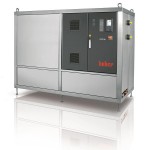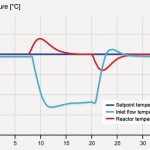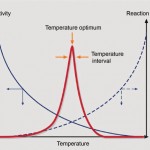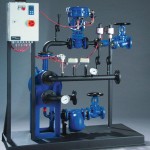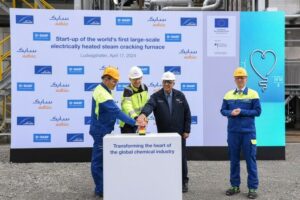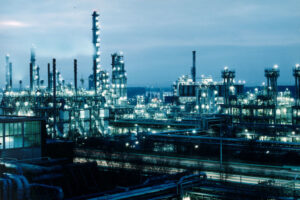Precise temperature control has a significant influence on performance and quality in chemical process engineering. The Unistat range of temperature control systems ensures accurate temperatures and stable process conditions in research laboratories, pilot plants and kilo labs worldwide. The new Unistat Hybrid technology additionally offers solutions for temperature control of large scale production reactors.
The author: Michael Sauer Marketing, Peter Huber Kältemaschinenbau
When it comes to chemical reactions in production processes the right temperature is critical and so, accordingly, is the need for an appropriate heating/cooling solution. Process engineers are called upon to find a compromise between yield, quality and productivity. The Unistat range has been developed and refined over the years with the support of process experts in the chemical and pharmaceutical industries. This collaboration has ensured that the Unistat products remain at the forefront of technology, making them suitable for controlling the temperature of chemical and bioreactors, autoclaves, mini plants and pilot plants, reactor blocks, calorimeters and distillation plants. Thanks to their thermodynamic characteristics, Unistats offer cutting-edge performance regardless of the application.
The concept guarantees reliable operation with precise results in stable process conditions, incorporating several functions and settings to aid the fine tuning of the application, such as TAC temperature control. TAC (True Adaptive Control) analyses the controlled fluid circuit and constantly adjusts the control parameters, facilitating precise control with minimal effort for the user. These settings and outstanding thermodynamics allow Unistat systems to excel even under frequently changing system conditions. To demonstrate the performance of the range and underline the Unistat’s ability to adapt to process requirements with precise stability and control, more than 200 case studies have been carried out.
Over 50 models
Over 50 models to suit every application are available as standard in the Unistat product group. They include very compact units as well as powerful devices for the controlling temperature of production reactors with a capacity of up to approximately 1000 l or more, depending on the application. The temperature range covered by the Unistat family extends from –120 to +425 °C, with cooling capacities up to 150 kW. They can also be custom-built to fit individual application requirements.
Safety and economy are hallmarks of the Unistat concept. The efficient energy management system keeps electrical power consumption to a minimum. Water use is likewise minimised, leading to lower operating costs. The hydraulically sealed design of the Unistat range prevents oxidation and the formation of oil vapours, prolonging the lifetime of costly thermal fluids by years. The Unistat pilot offers comprehensive safety features and monitors the process continuously, allowing the temperature control systems to run unattendedly. Alarms are activated in the event of an emergency; depending on the user settings, either the system is subsequently switched off or the emergency overtemperature protection function is activated. The machine is switched to 100 % cooling if there is a risk of thermal runaway. Supplementary features such as programmers, adaptive cascade control, ramp functions, calendar start, customised menus, sensor calibration and analogue and digital interfaces for integration in process control systems round off the Unistat functionality.
Options for weather protection and/or winter operation are also available, allowing the units to be installed outdoors and controlled remotely. Huber offers two solutions for Unistats working in Atex zones 1 and 2: either the system can be placed in an Ex-p pressure chamber or an Atex-certified controller can be mounted in the Atex zone while the Unistat remains in the safe zone.
Temperature control of large reactors
The introduction of the Unistat Hybrid technology extends the range allowing temperature control of large volume reactors of 10,000 l or more. It combines the precise control of the Unistat family with the power of a production facility’s existing energy resources such as steam, cooling water or liquid nitrogen, offering efficient process control and a partial affordable modernisation of legacy equipment.
Using the Hybrid system in this way allows the Unistat to manage the interaction of the individual energy sources and control temperature accordingly. This results in faster heating times for large volume reactors heated by steam as well as faster cooling times with liquid nitrogen or cooling water. The advantages of this technique are precise control, a broader temperature range, more heating and cooling power and reliable control of thermal reactions. Linking the Unistat Hybrid into an existing centralised cooling/heating system helps optimise process conditions and improve production output.
Professional scale-up and modernisation
The Unistat product range includes temperature control solutions for almost all applications in chemical process engineering. There are over 50 air and water cooled models to choose from, with cooling powers from 0.7 to 150 kW for temperatures from -120 to +425 °C. A wide assortment of accessories is additionally offered, for example sensors, thermal fluids, hose connections, Atex solutions, along with service agreements and certificates. Unistats guarantee a professional scale-up with the same stable process conditions from development labs through pilot plants to production systems.
The Unistat Hybrid can also be used to optimise existing temperature control solutions by linking them with a hydraulically sealed temperature control system. Modernisation provides several advantages:
- More heating and cooling power
- Utilisation of existing resources such as steam, cooling water, liquid nitrogen etc.
- Wider temperature range for existing systems
- Highly accurate control of the process temperature
- Reliable control of thermal reactions
- Affordable upgrading of existing systems
- Avoidance of expensive and time consuming system replacements
Online-Info: www.cpp-net.com/2211405
Share:



